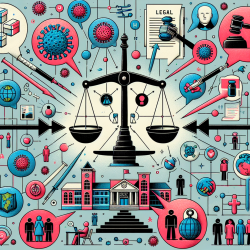Understanding Vaccine Infodemics: Ethical and Legal Insights for Practitioners
In the ever-evolving landscape of public health, practitioners are continually faced with the challenge of navigating ethical and legal complexities. The recent research article, "Ethical and Legal Debates on Vaccine Infodemics," offers a comprehensive exploration of these issues, particularly in the context of COVID-19. As a practitioner, understanding and implementing the insights from this research can enhance your professional capabilities and contribute to more informed decision-making.
The Rise of Infodemics
The term 'infodemics' describes the rapid spread of misinformation, particularly around vaccines, which can hinder effective public health responses. This phenomenon has been exacerbated during the COVID-19 pandemic, where misinformation has led to vaccine hesitancy and resistance. As a practitioner, it is crucial to recognize the impact of infodemics and work towards mitigating its effects through informed communication and education.
Ethical Considerations
The research highlights several ethical principles that are vital in addressing vaccine infodemics:
- Beneficence and Nonmaleficence: Practitioners have a moral obligation to act in the best interest of their patients, which includes advocating for vaccination as a means of preventing harm.
- Autonomy: While respecting individual choices is important, the research suggests that autonomy should not override public health imperatives when decisions affect the broader community.
- Justice: Ensuring fair access to vaccines and addressing disparities in vaccine distribution are crucial for equitable public health outcomes.
Legal Implications
Legal frameworks play a significant role in shaping vaccine mandates and addressing infodemics. The research discusses historical precedents and contemporary legal debates that influence current policies:
- Historical Context: Past pandemics have shown the effectiveness of vaccine mandates in controlling disease spread, despite legal challenges.
- Current Legal Debates: The balance between individual rights and public health safety continues to be a contentious issue, with courts often upholding mandates that protect public health.
Practical Applications for Practitioners
Practitioners can implement the research findings in several ways:
- Stay Informed: Regularly update your knowledge through credible sources to combat misinformation effectively.
- Educate and Communicate: Use clear, factual communication to educate patients and the community about the benefits and safety of vaccines.
- Advocate for Policies: Support policies that promote equitable vaccine access and address disparities in healthcare.
Encouraging Further Research
While the research provides valuable insights, it also highlights the need for ongoing investigation into the ethical and legal dimensions of vaccine mandates. Practitioners are encouraged to engage in further research to deepen their understanding and contribute to the development of effective public health strategies.
To read the original research paper, please follow this link: Ethical and Legal Debates on Vaccine Infodemics.










